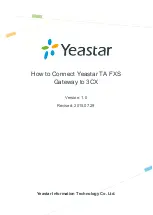
Prestige 2602HWL-DxA Support Notes
All contents copyright (c) 2005 ZyXEL Communications Corporation.
164
already runs on IP, by using IP as a platform integrate service is now possible and low cost where traditional
circuit may take long time to achieve.
What is the relationship between codec and VoIP?
In order to transfer voice (analog signal) over IP it first need to be digitized. Codec is a technic to digitize
analog signal to digital and vice versa. There are various speech codec available and can be used with VoIP
each with it's advantage and disadvantage.
What advantage does Voice over IP can provide?
The advantage of VoIP is it can provide advance services such as joining e-mail, instant messaging, video,
voice mail all together. Where current circuit switching (PSTN) can not.
What is the difference between H.323 and SIP?
H.323 and SIP are proposed by different group Session Initiation Protocol (SIP) is a standard introduced by the
Internet Engineering Task Force in 1999 to carry voice over IP. Since it was created by the IETF, it approaches
voice and multimedia from the Internet, or IP, perspective of view. Where as H.323 emerged around 1996, and
as an International Telecommunication Union standard it was designed from a telecommunications perspective.
Both standards have the same objective - to enable voice and multimedia convergence with IP protocols.
Can H.323 and SIP interoperate with one another?
In interoperability between the two, the industry is making slow but sure progress. Interoperability must first
happen between vendor implementations of the same protocol (SIP-to-SIP and H.323-to-H.323) and then
between protocols. Currently in order for SIP client to talk to H.323 client the ITSP must have a trunking
gateway act as a translator between the two protocols without the truncking gateway the two protocols are not
able to communicate to one another.
What is voice quality?
Voice quality is how well an person can hear the voice on the opposite end.
How are voice quality normally rated?
Voice quality is most commonly rated through a voice quality metric called the Mean Opinion Score (MOS)
which is recommendation by ITU-T. The MOS is a 5 point scale where 5 represent excellent voice quality
and 1 represent bad voice quality.
















































